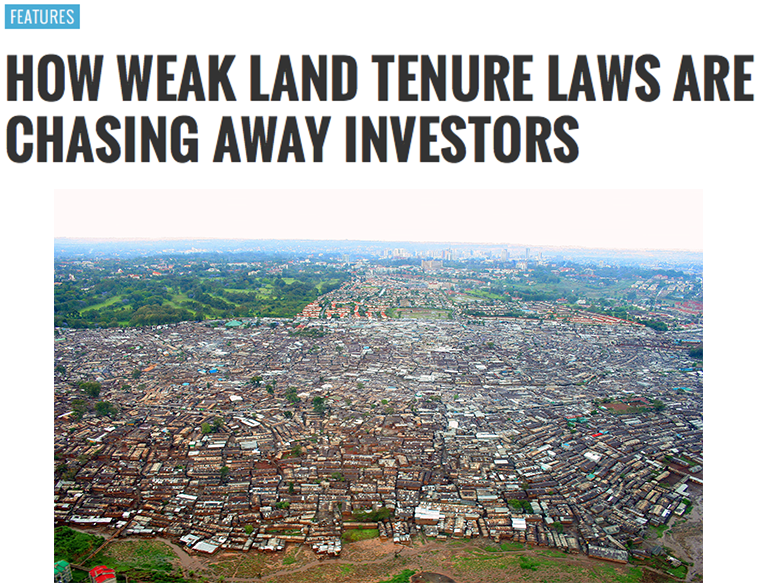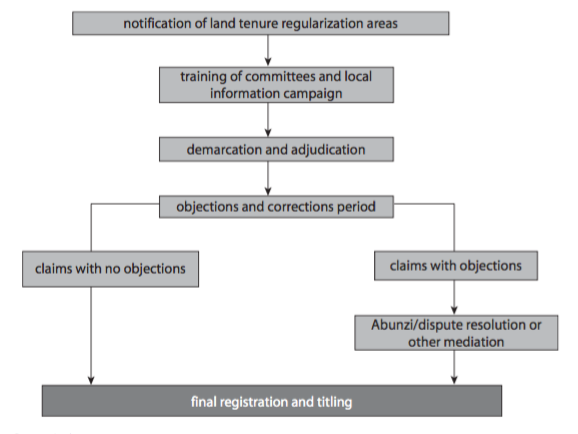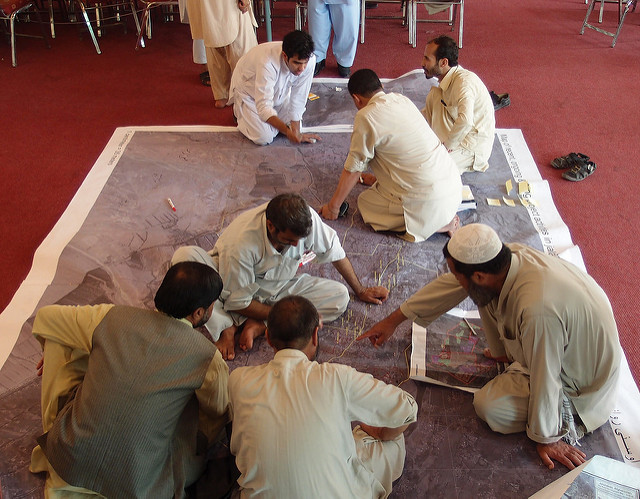
How can investments in land rights improve efficiency and liveability in cities?
For cities to be productive and liveable places, urban land needs to be used efficiently and intensively.
Well-functioning cities typically cluster firms and people together around productive central business districts and manufacturing centres that form the city’s employment engine. By contrast, many low-income cities are failing to use their land efficiently, instead growing outwards through sprawling self-built informal settlements.
Inefficient land use and insufficient investment, both in private properties and in public infrastructure, is often underpinned by weak land rights. In many cities, land is gridlocked in a web of competing ownership claims and overlapping tenure systems. This inhibits the private sector from either making substantial investments on land, or transferring it to a more productive user. It also prevents governments from coordinating a virtuous cycle of infrastructure provision, co-ordinated land-use planning and land taxation to fund these investments.
Given the politically challenging nature of reforms to land tenure, inertia has been a common policy response across many developing cities. However as demonstrated by experiences from Rwanda to Thailand, decisive public policy, backed by strong political support, can prevent these patterns of low investment and inefficient land use.
Key messages
- Secure, legally enforceable and marketable land rights underpin successful urban development. Secure land rights encourage owners to invest in improving their properties. Legally enforceable land rights enable governments to tax and plan land use. Marketable land rights allow land to be transferred to its most productive use.
- Informality is not the same as insecurity. Informal tenure systems can convey varying degrees of tenure security, but lack the benefits of legal enforceability and are not easily marketable.
- Cheaper intermediate formal forms of tenure can capture the benefits of legal enforceability, but are typically less marketable than freehold or long-term leasehold titles.
- Policymakers can learn from successes and failures in land tenure reforms across developing countries.
The importance of secure, legally enforceable and marketable land rights
Secure
Secure land rights enable investment by landowners. Evidence from across the developing world has shown that perceived tenure security, be it provided through informal or formal institutions, gives the certainty of future ownership that is essential if owners are to make substantial residential or commercial investments. In Lima, for example, a large-scale titling programme increased the rate of housing investments by over 60%1, whilst at the same time giving owners the security to leave their homes and travel to different parts of the city to find work.2
Legally enforceable
Legally enforceable land rights enable governments to impose obligations on landowners for the public good. Without legally enforceable land rights, governments and utility companies cannot identify who is liable for service payments and taxation of land and property, and are unable to coordinate land use planning through regulation on owners. Where such land rights are registered, governments are able to tax increases in land and property values that are in part the direct result of public investment. These taxes enable a virtuous cycle where appreciating urban land and property values finance the public investments that make the city more productive. In Rwanda, for example, large-scale registration of the country’s lands has unlocked a five-fold increase in land-related tax revenues from 2011-13.3
The legal definition of private rights over land also enables a fair and transparent process of establishing public rights over land. The ability of governments to acquire land for public purposes where necessary is an essential part of urban development. Without legally enforceable land rights to determine who is liable for compensation, land acquisition can be frustrated by opportunistic compensation claims by new settlers or companies lodging quasi-legal ownership claims.
Marketable
Where land can be bought and sold on an open market, this facilitates the transfer of land to its highest value use. Land markets enable firms to buy up land to form productive clusters, and allow land use to remain dynamic, in line with the changing needs of a rapidly developing city.
Currently, in many low-income cities, land rights are not easily marketable. This is largely due to the absence of formalised land records that allow legal recognition of new owners and generate publicly available information over land prices.4 When urban land markets cannot function properly, the result is inefficient land use. In Harare and Maputo, for example, more than 30% of land within five kilometres of the central business district remains unbuilt.5 In Nairobi, the low-rise informal settlement of Kibera originally formed in the early 20th century now occupies prime central land.
Since central land is difficult and expensive to transact, many firms and property developers therefore choose to locate in ‘leapfrog’ patches in cheaper areas of the city. Cities therefore become fragmented and disconnected, with firms dispersing across the city to offer predominantly local services, rather than forming productive clusters.
Beyond buyer to seller marketability, where land can be used as an asset that can be exchanged for credit on financial markets, this unlocks its use as collateral for large-scale loans and in particular for mortgage markets. This is particularly important in African cities, where only 3% of households can access mortgages.6 Generating a widespread mortgage market will be crucial in changing the patterns of urban informal sprawl that currently characterise many developing cities.
Tradeoffs between tenure systems
Informal or customary forms of land tenure are the status quo in large parts of low-income cities. These can provide important de facto tenure security to landholders, but typically lack legal enforceability and marketability, best conferred by freehold or long-term leasehold titles. Intermediate forms of tenure can represent flexible and low-cost methods of making land rights legally enforceable, but are typically less easily marketable than freehold or leasehold titles.
Informal land tenure
‘Informal land tenure’ is an umbrella term for tenure systems that are not formally recognised by the state within the legal system. This can range from de facto rights obtained by long-term occupancy, to well-established customary systems of tenure. Informal land rights are not synonymous with insecure land rights. In fact, in some circumstances perceived tenure security of households and firms can be higher under informal, accountable local bodies than under a weak and corruptible formal tenure system. However, where community ties have been eroded by urban development and land ownership is contested between a web of different actors, the result can be fragile tenure security.
Without formal state recognition, informal land rights lack the benefits of legal enforceability, impeding effective urban planning, and depriving governments of important revenue flows from land and property taxation. Informal land rights also limit the marketability of land in two ways. First, without formal legal recognition of new ownership, buyers and banks may not be confident that their full rights to land will be respected the prevailing informal authorities. Second, without the publicly observable record of land transactions and historic valuations that a well-administered formal land market can provide, informal land transactions fail to generate the common knowledge of market prices that is essential for a well-functioning land market.

In many cities, prime central land is occupied by vast informal settlements, such as Kibera in Nairobi (above). Weak land rights leave investors reluctant to purchase this land to use it more efficiently – for commercial property or medium-high rise housing. (Photograph: Schreibkraft)
Freehold and long-term leasehold titles
Freehold and leasehold titles are the predominant form of land rights in developed economies. Under freehold tenure, a private owner, such as an individual or corporation, has full and perpetual rights to develop, collateralise, and sell the land they own. Under long-term leasehold tenure, a landowner, typically the government, issues a lease conveying such rights to a leaseholder for a period typically lasting 49-99 years.
If accompanied by well-functioning legal and administrative systems, freehold and long-term leasehold titles are the gold standard of land ownership, capturing the full benefits of secure, legally enforceable and marketable land rights. In Lima, the issuance of over 1.2 million freehold titles to urban households increased the rate of housing investments by over 60% and unlocked significant land market activity. Land values for titled properties rose by 20-30%, and land market transactions increased by 134% between 1999 and 2003.7
However, freehold and long-term leasehold titles are politically and financially challenging to register. In particular, since freehold titles convey perpetual land ownership, issuing such titles in the context of informal settlements on contested land is often far less politically feasible than implementing intermediate forms of tenure such as short-term occupancy certificates. Furthermore, surveying procedures are typically more stringent and expensive than for intermediate forms of tenure; collective titles issued to whole communities can be four times less costly to implement than private land titles.8 Freehold and long-term leasehold titles also require strong legal systems to prevent land-grabbing post-titling, and strong administrative systems to ensure land transactions are efficient and based on fair valuations.
Intermediate forms of tenure
Where existing legal and administrative systems are particularly weak, or where registering freehold or leasehold tenure is as yet politically or financially infeasible, legal recognition of differing forms of tenure can act as a useful temporary measure towards official freehold or leasehold land titles. These alternative forms of tenure can often be well-suited to the needs of informal settlements, particularly in peripheral areas. This is because they increase tenure security, and unlock the process of urban planning, infrastructure provision and land taxation that comes with legal enforceability. However, they are poor forms of collateral for banks, and are also less able to be transacted than freehold and leasehold titles, making them less suited for more central urban areas where efficient land use is key.
In Trinidad and Tobago for example, Certificates of Comfort have been granted to squatters on state lands. These do not confer full ownership on titleholders (this remains in the hands of the state) but do provide a lifetime guarantee against the threat of eviction, as well as facilitating service provision and tax collection. However, these cannot be transferred either through sale or through inheritance, and act as poor quality collateral.
In Thailand, the 2003 Baan Mankong programme issued collective land titles to informal settlers as a key part of its slum-upgrading scheme. These were developed in collaboration with communities, based on concerns that private freehold or leasehold titles would be costly to implement and could lead to the disintegration of the community. The programme integrated communities into city planning processes, and proved highly successful in increasing homeowner investment; the share of urban dwellers living in houses made from durable materials increased from 66% in 2000 to 84% in 2010.9 However, collective land titles may frustrate the ability of land markets to transfer land to more efficient uses. They also risk institutionalising powerful local leaders, who may become reluctant to relinquish control over group tenure.
Strengthening legal and administrative systems
In transitioning to a well-functioning system of land rights, first and foremost, there is a need to strengthen the formal legal and administrative systems governing land. These provide the practical conditions required for courts to enforce ownership, governments to tax and plan land use, and markets to transfer land to its highest value use. Strengthening these systems is not only a necessary precondition for large-scale land registration, but is also typically easier for cities to implement in the shorter-term. Where a strong formal system is in place, large-scale programmes of land registration can unlock the benefits of secure, legally enforceable, and marketable land rights in areas currently under informal or customary tenure.
Legal and administrative reforms
Where formal legal procedures are long, inefficient and costly, this increases opportunities for corruption, deterring investors, and leaves the formal legal system inaccessible to low-income households. Before a recent set of reforms in Ghana, for example, over 50% of all new civil cases lodged were related to land, and the average length of a land-related case was between two to five years.10 Specialised courts dedicated to land issues have helped to expedite land dispute resolution procedures, especially where they have encouraged greater emphasis on pretrial settlements to avoid lengthy legal battles.
Land administration systems in African cities are also often in urgent need of reform. One key reason behind lengthy processes of property transactions, overlapping ownership claims and outdated valuation records, is the fact that over 80% of Sub-Saharan African and South Asian countries still have paper-based systems, with significant disparities between local and central government land records. Two interrelated reforms which have helped to address these inefficiencies are to computerise and synthesise records, and to decentralise land administration. Decentralising land administration can make it easier and less costly for residents to register transactions, as well as facilitating increased local awareness of land rights. In Ghana, where the computerisation of land records was combined with a decentralisation of deed registries to ten regional centres, the average time to register property transfers was cut from 169 days in 2005 to 34 days in 2011, and valuation rolls can automatically be updated based on registered transfers.11
Large-scale land registration programmes
In many low-income countries, the process of land tenure regularisation is frustrated as individuals are expected to register their own ownership claims, often through lengthy, complicated and expensive registration processes. In Lagos, for example, titling expenses can reach 30% of construction costs. 12
By contrast, cross-country experiences show that large-scale government-funded registration programmes are far more cost-effective, avoiding repeated and costly surveyor visits to the same area. In Tanzania, surveying at scale is over 20 times cheaper than surveying single parcels.13 Furthermore, land rights have strong public benefits, such as supporting rule of law, functioning land markets and enabling land taxation, which individuals do not take into account when deciding whether to register their land. Government funding is therefore required to capture these benefits. This can be seen as a long-term investment in future revenues, requiring a significant initial outlay on surveying costs, but enabling large and increasing long-term revenue flows through broad-based land and property taxation.
Process for Land Tenure Regularisation Programme in Rwanda

In implementing such registration programmes successfully, key steps in the decision-making chain are:
1) Awareness-raising on land registration
Awareness-raising before embarking upon large-scale registration programmes is often necessary to ensure the public understanding of the legal rights and responsibilities that come with formal property titles. Where owners are not informed of their rights, this leaves them vulnerable to sell off land at below-market prices. Where owners are not informed of their responsibilities, they may be reluctant to pay for property taxes or utility connections. Public awareness-raising can also help to build the political support that is often vital in overcoming significant political hurdles to the process.
2) Mapping and surveying land plots
Mapping and surveying procedures typically constitute over 50% of the cost of land registration programmes. Close scrutiny over the cost-efficiency of this process is therefore integral to enable governments to recoup their investments from land-titling in taxation. Without such scrutiny, surveying professionals may recommend expensive, state of the art technologies both unnecessary and unsuited to low-income contexts. In Tanzania, expensive cadastral surveying procedures result in costs of up to $6,000 per parcel for one-off visits, and up to $160 for large-scale systematic demarcation. 14
One way to reduce the costs associated with official mapping and surveying procedures is to issue intermediary collective land titles which do not require internal boundary demarcation, or, as implemented recently in Namibia, to create a parallel land registration system for titles that fall short of full ownership. However, in many ways more sustainable is to reduce the cost and complexity of issuing full freehold or long-term leasehold titles. In Rwanda, during the 2009-13 Land Tenure Regularisation programme, mass participatory exercises were conducted with locally trained parasurveyors based on aerial and satellite photographs. Freehold and leasehold titles were issued for almost all of Rwanda’s estimated 10.3 million land in a space of five years, and at an average cost of only $6 per parcel.

Participatory demarcation of land boundaries, using satellite images or aerial photographs, has proved successful in lowering the costs of mapping and surveying across the developing world (see above, taken in Jalalabad, Afghanistan. Credit: Flickr, USAID)
3) Adjudicating between competing ownership claims
Where possible, competing claims over land are best resolved through formal legal proceedings. However, where such institutions lack the capacity or required documentation to effectively adjudicate between claimants, local dispute-resolution mechanisms can be more effective. In Rwanda, after initial mapping and surveying was carried out in the presence of local residents, any dispute unable to be resolved either on the day of the survey or after a 60-day mediation period was taken to local judicial authorities (abunzi). The open nature of dispute resolution, combined with the legitimacy and close community ties of these authorities, helped to prevent opportunistic ownership claims being lodged after the programme was announced.
However, particularly in the case of large-scale disputes between landlords and occupiers of informal settlements, there may be a need for more active government involvement. There are typically two options in these cases: awarding land rights to informal settlers, which usually happens in the context of slum upgrading programmes, or awarding land rights to landlords and resettling occupiers in a different location.
Where policymakers are content to retain land under residential use, slum upgrading is a cost-effective solution that can enable informal settlements to incrementally transform into dense and liveable neighbourhoods, integrating the city’s low-income workforce into the urban fabric. However, where existing land use is highly inefficient from a city-level perspective, resettlement frees up land for more productive purposes, including vital urban infrastructure, and commercial real estate to form the city’s employment engine. On the other hand, without the financial resources to adequately rehouse displaced residents in well-connected locations, such resettlement programmes typically leave residents excluded from the social and economic fabric of the city. In many cases, the majority of resettled residents have simply chosen to move back to more slums where they have social ties and economic opportunities. 15
Resolving disputes early: Land registration on the urban periphery
The simplest and most cost-effective policy option to avoid the large-scale land disputes that currently characterise many urban informal settlements is to clarify ownership before large-scale settlement has taken place. This can be achieved through a proactive process of registering land ownership claims on the urban periphery, in advance of urban expansion. This can be accompanied by government purchase of cheap land on the urban periphery to fit core infrastructure and housing foundations in advance of settlement. Planning such infrastructure in advance can be three times less costly than retrofitting after informal settlements have formed.
Both of these options may require policymakers to address the vested interests of individuals who have been able to extract significant rents through strong de facto, quasi-legal ownership claims. In many cases, legal and political challenges from vested interests may require claims to be bought out through compensation. This compensation is expensive, but represents the price of clarity over land rights. In the long run, such compensation can be far less costly than the wasted productive potential that results from contested tenure arrangements. In Kibera for example, the cost of current land-misallocation amounts to over $1 billion. Auctioning off this land to property developers would provide a windfall large enough to compensate slumlords at the value in perpetuity of future rent payments and obtain a surplus of $13,000 per household. This would be more than enough to help to relocate tenants currently paying an annual rent of $260 per household. 16
Aside from traditional options for resolving competing claims, land-sharing agreements could represent an innovative alternative solution. Under these agreements, slum dwellers can be rehoused on part of the contested land in medium-high rise housing, with housing and infrastructure costs subsidised by landlords who benefit from the liberation the rest of the disputed land for commercial or higher-value residential development. In Bangkok, Thailand, during the 1970s and 1980s, government officials brokered seven such land-sharing deals between slum dwellers and landowners to achieve win-win solutions.
4) Ensuring continued use of the formal system
Costly investments in land registration risk being undone unless governments can ensure continued use of the formal system to register property transfers. In Buenos Aires, a large-scale land titling programme unlocked significant investment and property tax revenues, but these gains risk being reversed through a process of ‘deregularisation’ – 78% of property transfers since registration have taken place informally. This is hardly surprising since the cost of a formal property transfer was approximately 30% of property values in recently titled areas.17 For land to remain formally registered, formal procedures for land transfer will therefore need to be be cheap, accessible and not overly burdensome, in turn requiring ongoing efforts to streamline land administration.
Recommended further reading
An extended Cities that Work synthesis paper on land rights is available here.
- Sagashya, D. G. (2012), “Rwanda: Reforming Land Administration to Enhance the Investment Environment”, published in Untying the Land Knot: Making Equitable, Efficient, and Sustainable Use of Industrial and Commercial Land, pp57-70
- Land Sharing as an Alternative to Eviction. Shlomo Angel and Somsook Boonyabancha. In Third World Planning Review, 10 (2) 1988.
- Byamugisha, Frank F. K. 2013. “Securing Africa’s Land for Shared Prosperity: A Program to Scale Up Reforms and Investments”, Africa Development Forum series. Washington, DC: World Bank.

